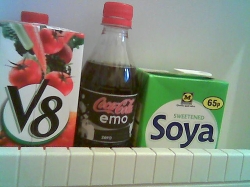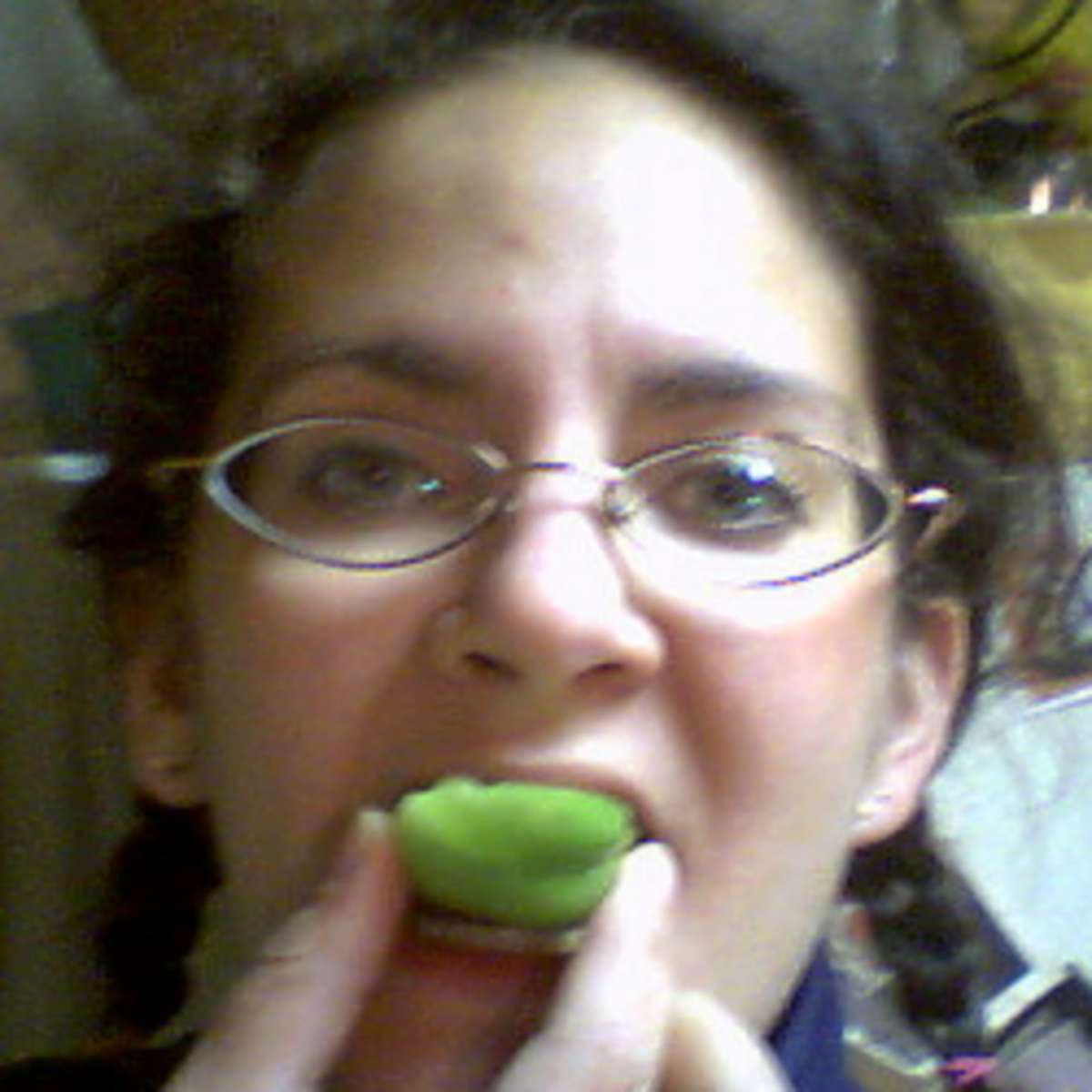The Case of the Supertaster, the Superveggie, and the Fizzing Thing

A Tale of Sensory Processing Differences
I didn't start out today to write about the phenomenon of super tasting. I started out writing about cruciferous vegetables, but got side tracked by a memory of carbonation. The side tracking began -- those first few steps were taken -- when I read that a portion of the population had a more sensitive sense of taste, apparently for genetic reasons. The sensitivity was especially strong when it came to bitter flavors. (Hence, that stereotypical childhood aversion to broccoli. Super tasters don't like their super veggies.)
That got the wheels in my head turning. I didn't experience those vegetables as bitter in childhood. I liked brussel sprouts and broccoli better than some other vegetables because they weren't boring. Another childhood memory is of eating raw lemon (no sugar added). My parents marveled how, unlike many children, I would try exotic foods. That didn't mean I was into food, though. There were some foods I strongly liked and some I strongly disliked, but in general... Well, it took a long time to chew, and food just wasn't interesting enough to keep me bound to the chair chewing.
My first thought was, "A super taster I'm not!" But then the picture got a little more complex. I've always had an aversion to carbonation, though it's gotten milder since childhood. There were times in my growing up years when my mother tried to get me to drink something carbonated, perhaps because I had a stomach flu, perhaps because we were out of healthy beverages. I remember her telling me when I was a teenager, "But it's not Coke. It's pure bottled water." How could I explain to her that I couldn't tell the difference between sparkling water and Coke? The carbonation was so corrosive and so overpowering that flavor didn't exist.
Then there's the matter of toothpaste. It's not just that many tooth pastes set my mouth afire; it's that, when I was younger, I would rinse and rinse, and then forget about having brushed. As many as six hours later, I would have a sip of juice and my mouth would go on fire again. (No eating lemons after tooth brushing -- that goes without saying.) The toothpaste response seems to have mellowed some over the years, but it didn't happen until I was well into my 30's.
Taste research intrigues me because it relates to a pet issue: We often assume people respond differently to their environment, and don't understand they perceive it differently...
The Salty Taste
Do people who are attracted to salt have stronger than average sense of taste... or less strong? It's not as obvious as it would seem on the surface. Super tasters typically perceive bitter as too bitter, sweet as too sweet, sour as too sour. And they perceive salty as... mmm, mmm good. (At least according to one scientific study.)
This article explores the phenomena of super tasters craving salt. For some reason, salty isn't typically experienced in that "too much" way. Salt can be a good cover for other flavors that are perceived as too strong. Take away the salt, and things start tasting funky. A low salt cheese, for example, can taste bitter.
- Super Tasters and Salt
CNN Health explores the phenomena of super tasters being drawn to high sodium foods
The Super Taster Test - And Sensory Processing
There is a super taster test where participants taste a compound called PROP. Some respond very strongly to the bitterness, finding it almost overpowering; others taste nothing at all. The article linked to below is by writer who was allowed to go through some taste tests. What I found most striking was her description of the super tasters' reaction when they realized that others had experienced nothing -- that, in one small way, they weren't living in the same world as the person next to them. This little scene can be translated outward: It's not all about kids who refuse to eat their veggies. It's about those who misbehave or behave in ways that are inexplicable. If we analyze other's behaviors on the basis of imagining what would cause us to behave in a similar fashion, we'll run into trouble.
There's another thing about the taste research that interests me. The writer notes that the researcher had noted some irregularities: Parts of her tongue had more dense fungiforms than the norm; others had less. The researcher even detected a part of her tongue that had nerve damage and had none.
Irregularities... I wonder if that could explain why I am not fussy about foods, but am fussy about beverages. I like almost all fresh fruits -- very little tastes overly sweet. I don't like many fruit juices, though. Vegetable don't taste bitter to me, and they don't need salt. But vegetable juice is another matter. My mother had a juicer when I was little. I liked carrots fine, but as soon as a carrot was juiced, it would literally make me gag. I wonder: What is different about the way we hold a beverage in our mouth, what parts of the tongue it touches, how we swallow?
- Tourist in a Taste Lab
An account of being a participant in tests of the sense of taste.

My Niece's Tastes
My older niece was a skinny little baby. She had reflux as an infant, but for several years, she just didn't seem to like eating. She was somewhat below average in height, but not so very short. Her weight, though, was in the bottom percentiles. My brother and his wife tried a lot of things to get calories into her. Long past the time children have typically outgrown formula, she went to bed with a bottle of fortified milk. As a two- or three-year-old, I believe she was getting a nightly drink of milk with formula added. Small bites of food did the 'zoom-zoom airplane thing' at her house. In the evening, the little girl would run around the room, and her parents would try to coax a bit more food into her. Some of it was not nutritious at all. My brother might succeed in getting her to eat a french fry or two or a couple of M & Ms. A little later, he'd manage to get something more into her.
She's ten now and has outgrown her disinterest in food. She's thin, but has a taste for junk food. Vegetables? Oh, my, no. My brother lamented that he meant his kids to grow up with healthy tastes. He feels like he taught her to like french fries -- but what else could he do?
I ponder: Does she perceive tastes more strongly... or less? I remember how, as a small child, I thought food was boring. I wonder if that was my niece's reaction. I've been reading that people with less sensitive taste -- the so-called non-tasters -- are often drawn to sweet or fatty foods. If a child doesn't want to eat their vegetables, are they perceiving them as bland and boring -- or as acrid and bitter? It can be hard to say...
As for me, I've stayed skinny all my life, but people might be surprised at my tastes. I like sweet things, fatty things, spicy ethnic foods, cruciferous veggies with creamy dressing.
Super Taster or Non-Taster?
People can be super tasters, nontasters, or average. Nontasters generally do have a sense of taste, but they experience flavors less intensively. (They may crave more intense flavors and have a sweet tooth, so don't think nontasters are necessarily disinterested in food.)
Do you think you have a strong sense of taste or a weak one?
A Note on Sensory Processing
Children with sensory processing disorders or autism may be very sensitive to textures as well as tastes. Taste sensitivities may not be the same as for the classic super taster. (They might be more extreme.)
The Taste of Tooth Paste
In the thread below, parents discuss children who have an aversion to tooth paste, or at least to most brands of it. Some of the moms chalk it up to having super taster tendencies. Tom's of Maine is given a thumbs up by many. One mom says her little girl likes to brush with baking soda.
I concur with the Tom's of Maine verdict -- I brush with Silly Strawberry myself. But baking soda? I find baking soda toothpastes to be among the most corrosive of tooth pastes. Now I am thinking about how baking soda fizzes when it touches acid, and how something akin to baking soda is used in those fizzing health drinks. Do most tooth pastes have something in them that reacts with acid? And does that something... fizz? Is my toothpaste response an overblown response to fizzing? Is it more of a taste thing or a hypersensitivity to a textural element?
I am thinking a reaction to fizz is a very different than a reaction to bitter tastes, even if they often occur together, in people who have hypersensitivities.
- A thread about aversion to toothpaste
On MotheringDotCommunity.
Credit
- Picture of Veggie Juice and Cola
felixrenicks, Flickr Creative Commons








